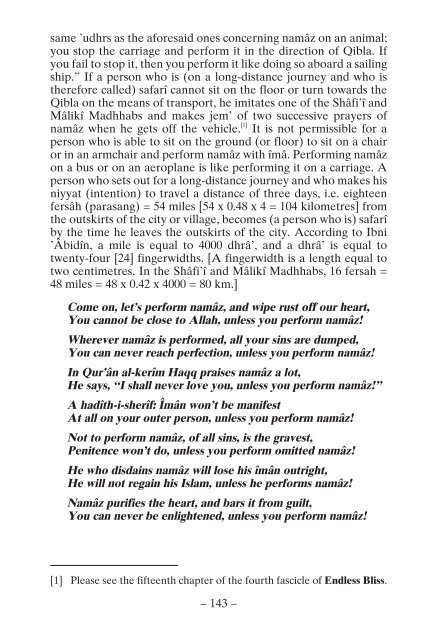Miftah-ul-Janna (Booklet for way to Paradise)
Create successful ePaper yourself
Turn your PDF publications into a flip-book with our unique Google optimized e-Paper software.
same ’udhrs as the a<strong>for</strong>esaid ones concerning namâz on an animal;<br />
you s<strong>to</strong>p the carriage and per<strong>for</strong>m it in the direction of Qibla. If<br />
you fail <strong>to</strong> s<strong>to</strong>p it, then you per<strong>for</strong>m it like doing so aboard a sailing<br />
ship.” If a person who is (on a long-distance journey and who is<br />
there<strong>for</strong>e called) safarî cannot sit on the floor or turn <strong>to</strong>wards the<br />
Qibla on the means of transport, he imitates one of the Shâfi’î and<br />
Mâlikî Madhhabs and makes jem’ of two successive prayers of<br />
namâz when he gets off the vehicle. [1]<br />
It is not permissible <strong>for</strong> a<br />
person who is able <strong>to</strong> sit on the ground (or floor) <strong>to</strong> sit on a chair<br />
or in an armchair and per<strong>for</strong>m namâz with îmâ. Per<strong>for</strong>ming namâz<br />
on a bus or on an aeroplane is like per<strong>for</strong>ming it on a carriage. A<br />
person who sets out <strong>for</strong> a long-distance journey and who makes his<br />
niyyat (intention) <strong>to</strong> travel a distance of three days, i.e. eighteen<br />
fersâh (parasang) = 54 miles [54 x 0.48 x 4 = 104 kilometres] from<br />
the outskirts of the city or village, becomes (a person who is) safarî<br />
by the time he leaves the outskirts of the city. According <strong>to</strong> Ibni<br />
’Âbidîn, a mile is equal <strong>to</strong> 4000 dhrâ’, and a dhrâ’ is equal <strong>to</strong><br />
twenty-four [24] fingerwidths. [A fingerwidth is a length equal <strong>to</strong><br />
two centimetres. In the Shâfi’î and Mâlikî Madhhabs, 16 fersah =<br />
48 miles = 48 x 0.42 x 4000 = 80 km.]<br />
Come on, let’s per<strong>for</strong>m namâz, and wipe rust off our heart,<br />
You cannot be close <strong>to</strong> Allah, unless you per<strong>for</strong>m namâz!<br />
Wherever namâz is per<strong>for</strong>med, all your sins are dumped,<br />
You can never reach perfection, unless you per<strong>for</strong>m namâz!<br />
In Qur’ân al-kerîm Haqq praises namâz a lot,<br />
He says, “I shall never love you, unless you per<strong>for</strong>m namâz!”<br />
A hadîth-i-sherîf: Îmân won’t be manifest<br />
At all on your outer person, unless you per<strong>for</strong>m namâz!<br />
Not <strong>to</strong> per<strong>for</strong>m namâz, of all sins, is the gravest,<br />
Penitence won’t do, unless you per<strong>for</strong>m omitted namâz!<br />
He who disdains namâz will lose his îmân outright,<br />
He will not regain his Islam, unless he per<strong>for</strong>ms namâz!<br />
Namâz purifies the heart, and bars it from guilt,<br />
You can never be enlightened, unless you per<strong>for</strong>m namâz!<br />
[1] Please see the fifteenth chapter of the fourth fascicle of Endless Bliss.<br />
– 143 –

















